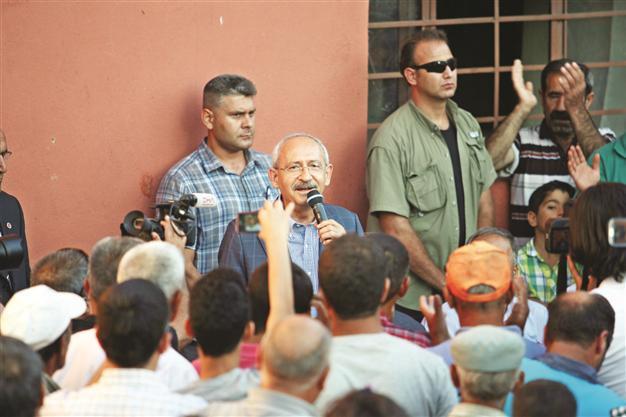Turkish main opposition leader says specially authorized courts ‘illegitimate’
ANKARA - Doğan News Agency

The main opposition Republican People’s Party (CHP) leader Kemal Kılıçdaroğlu addresses locals in Burmageçit village of Tunceli province. AA photo
Specially authorized courts do not have any legitimacy, main opposition Republican People’s Party (CHP) leader Kemal Kılıçdaroğlu said, adding that he did not recognize rulings by them.
He was apparently referring to a recent controversial ruling by a specially authorized court that convicted a former top commander and more than 250 other people on charges of attempting to overthrow the government of Turkey.
“Specially authorized courts do not exist in democracies. Rulings made by specially authorized courts are not legitimate in democracies. The judiciary needs to be independent and impartial; the judiciary should not be in the hands of the political authority,” Kılıçdaroğlu said in an interview with Doğan news agency Aug. 9 in the eastern Anatolian province of Tunceli, his hometown, where he was observing Eid al-Fitr.
Decisions made by the martial law courts in the aftermath of the Sept. 12, 1980 military coup d’état were not accepted by the conscience of the society, Kılıçdaroğlu said. He also said a court established after the May 27, 1960 coup against the Democratic Party (DP) government led by late Adnan Menderes that sentenced the toppled prime minister, Menderes, to death, was not a “natural” court and the decisions made by it were not accepted by the conscience of society either.
“The extraordinary courts do not deliver justice, the extraordinary courts fulfill the orders of the political authority; that’s why we do not consider the decisions made by these courts legitimate. We do not consider the judges serving there as judges either. No offense. If you limit the right to defense, then should we consider him a judge? Should we consider that court as the court that delivers justice?” Kılıçdaroğlu said.
On Aug. 5, an Istanbul court handed a life prison term to retired Gen. İlker Başbuğ, a former chief of General Staff, and convicted more than 250 other people in connection with an ultra-nationalist “terrorist” network, dubbed Ergenekon, found to have plotted against Prime Minister Recep Tayyip Erdoğan’s government and engaged in acts of violence.
The specially authorized courts were established by the ruling Justice and Development Party (AKP) government in 2004 as part of reforms concerning the EU membership bid, replacing the infamous State Security Courts (DGMs).
With the third judicial reform package adopted in the summer of 2012, the specially authorized courts were abolished; instead, regional serious crimes courts were set up under Article 10 of the Anti-Terror Law (TMK) to hear the same criminal cases. These courts have specialized judges whose only task is to decide on preventive measures during the investigation phase.
The office of the specially authorized courts, which were already dealing with a case at the time of the adoption, will turn into regional serious crimes courts after they complete the related cases.
